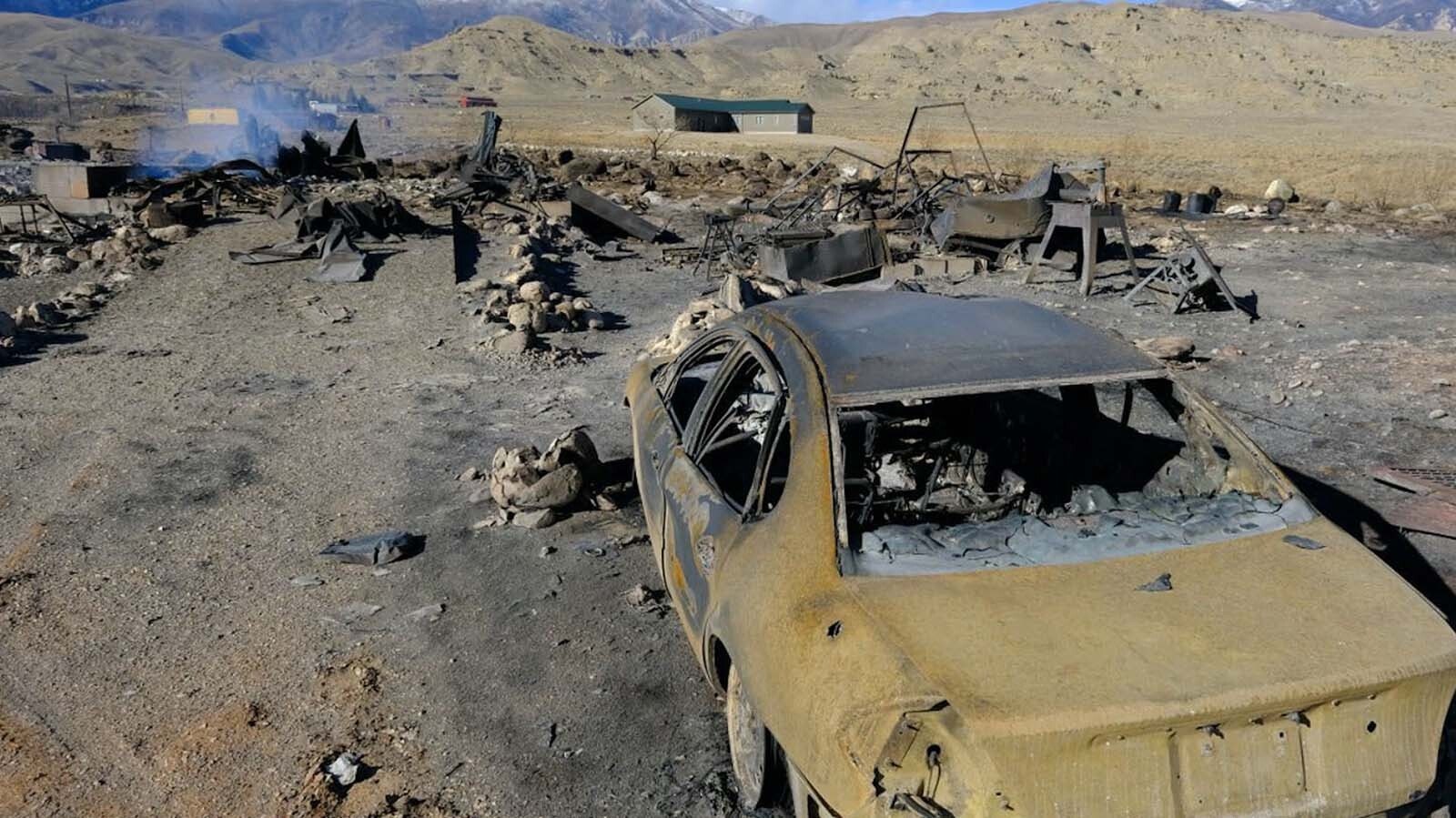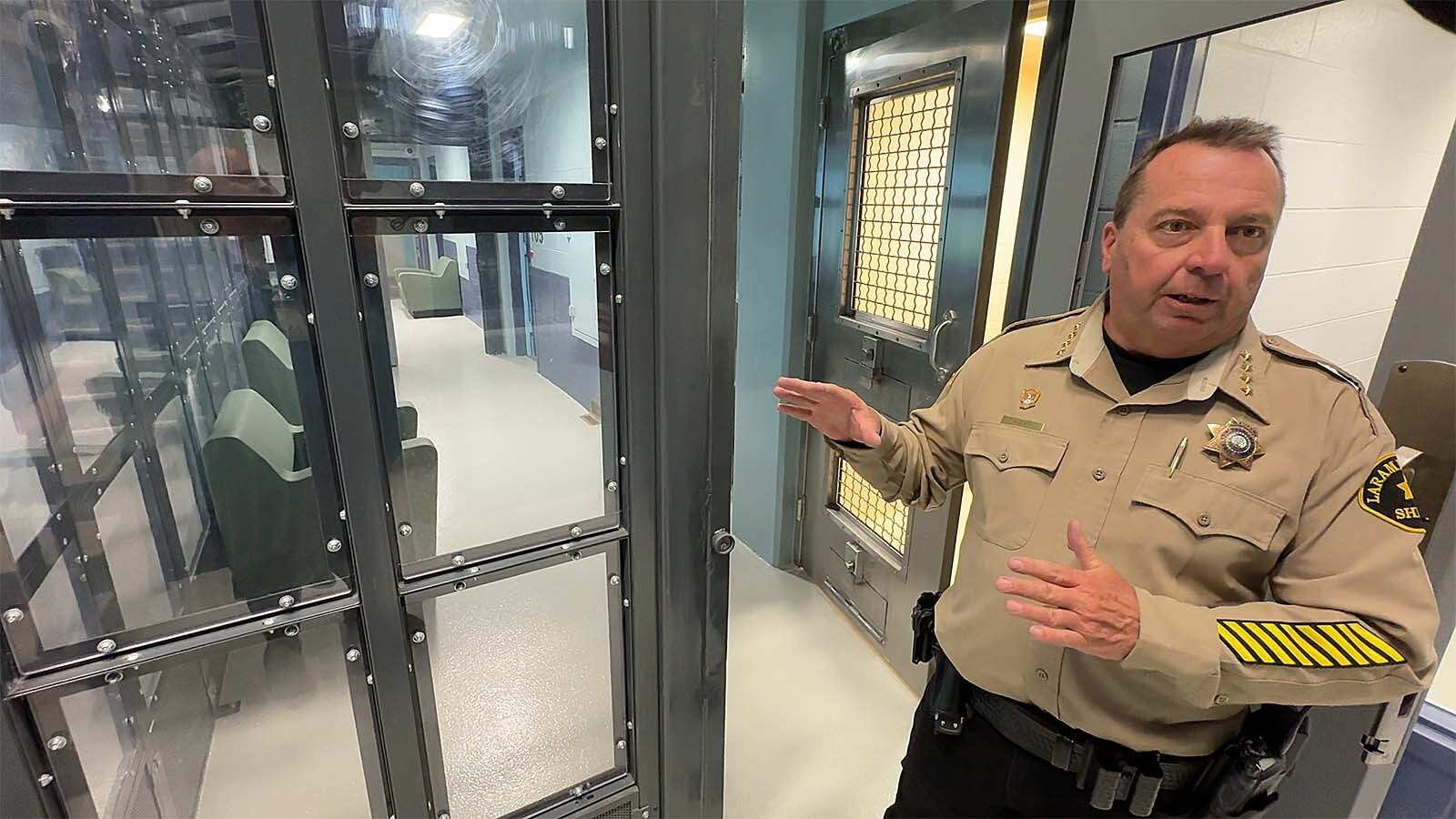CHEYENNE — There have been many theories about what sparked a devastating wildfire that ripped through Clark, Wyoming, and killed a local woman in 2021. But one her widower Jerry Ruth doesn’t buy is that it was an “act of God.”
Ruth is asking a judge for a summary judgment in his lawsuit against Beartooth Electric Cooperative and Asplundh Tree Expert, which have denied that they contributed to the fire and that it was an “act of God.”
In 2022, Ruth filed a wrongful death lawsuit against Beartooth and Asplundh, asking for $75,000 or more in damages.
On Tuesday morning, attorneys for Ruth and the companies presented their cases before Judge Kelly Rankin in Wyoming District Court in Cheyenne.
It’s been almost exactly two years since the November 2021 fire that burned 300 acres of land and destroyed three homes, seven outbuildings and a bridge, in addition to killing Ruth’s wife, Cindy Ruth.
“We don’t think reasonable minds can differ as them (Beartooth) having a duty to protect people of the community,” said Ruth’s attorney, Ian Sandefer.
Power Line And Trees
Beartooth is the main electricity provider for the Clark area. Ruth and other fire experts believe that high winds caused a Beartooth power line to make contact with a nearby tree, which led to an arcing burn across the tree that eventually grew into the wildfire.
There were exceptionally high winds on the night of the fire with gusts exceeding 100 mph, which the investigative expert hired by Ruth believes caused the burn to cast over to a field some distance away where the wildfire spread.
Prior to the fire, Beartooth had hired Asplundh to trim the tree that made contact with the power line.
The distance between the tree and the power line, 6 feet, was less than the minimum required distance as was contractually required between Beartooth and Asplundh. However, Beartooth attorney Henry Bailey noted Tuesday that there is no required distance between trees and power lines under national power line codes, but the code does require vegetation be managed near power lines.
Sandefer said his expert determined that winds gust at more than 60 mph around nine times a year in Clark, a scenario he asserted Beartooth should be well prepared for.
Clark has a reputation for being the windiest place in Wyoming.
Although Bailey agrees that Beartooth had a responsibility to protect the community, he believes the unusually high winds should be blamed for starting the fire, not any negligence on the part of the company.
“This was a horrific tragedy, but we do believe there was a number of things that happened that evening that caused Ms. Ruth to die,” he said.
An expert hired by Asplundh said they could not definitively determine the cause of the fire that started 143 feet away from the tree and lacked any sign of fire in between that distance.
Act Of God?
Bailey similarly argued Tuesday that there are too many questions remaining about the fire to definitively blame Beartooth or any other party involved.
“I don’t understand how we can have summary judgment and go to trial with all the evidence presented,” he said.
He also said there were unforeseen actions taken by fire responders and the Ruths on the night of the fire that contributed to Cindy Ruth’s death.
After the fire started, Jerry Ruth, a volunteer firefighter, was advised by another fire responder to call his wife and tell her to get out of their home. By the time the fire was over, it was determined that if Cindy had stayed in her home, she likely would have survived. The only fire damage suffered to the structure was to one of its corners, as well as some smoke damage on the interior.
“Sometimes people are left in a position because of other’s negligence, where they don’t have another option,” Sandefer said.
Cindy Ruth left their home in her Subaru with her dogs in tow and drove a short distance before parking and attempting to escape the fast-moving flames on foot. Investigators determined that if she had stayed in her car, she likely would have survived as her pets were found unscathed inside the vehicle. Also, if she had run in the opposite direction on foot she would have likely survived as well based on the fire’s burn path.
“There’s too many factors here where reasonable minds would differ,” Bailey said. “Sometimes people die, bad things happen where nobody is at fault. A Wyoming jury may conclude this might be one of those cases.”
Sandefer did not find these arguments compelling as far as shifting blame away from Beartooth or Asplundh for Cindy Ruth’s death, and Rankin seemed to agree, adding in that it was windy and dark on the night of the fire.
Emotional Distress?
Asplundh also has made a request for summary judgment, asking Rankin to reject Ruth’s allegation of negligent infliction of emotional distress against the company.
The tree trimming company has argued that since Ruth didn’t see his wife while she was dying or her body in the immediate hours afterwards, his claim for emotional distress does not qualify.
“You must either observe that it happened or you must come on it within a certain period of time,” argued Asplundh’s attorney, Colin Munro.
Sandefer argued that special circumstances prevented Ruth from seeing his wife on the night of the fire as he was actively trying to douse the flames himself as a member of the Clark Fire District. Although Ruth saw the outline of his wife’s body in a body bag the night of the fire, another person confirmed her identity to emergency responders.
“There’s a strong connection between the conduct and the emotional injury,” Sandefer said. “It’s a situation where the defendants, they hold all the keys. Who’s in the best position to prevent it from happening again in the future? Clearly, it’s Beartooth and Asplundh.”
Rankin said he will make a ruling on the summary judgment motions in the coming weeks. A trial is scheduled to begin Jan. 8, 2024, but Ruth told Cowboy State Daily the parties plan to enter mediation next week in Denver.
Leo Wolfson can be reached at leo@cowboystatedaily.com.





